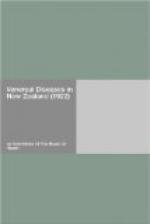The Committee also recommend further provision to deal with cases in which persons suffering from venereal disease are not under medical treatment and are likely to infect others. If the Director-General of Health has reason to believe that any person is so suffering he may call on that person to produce a medical certificate, which may be procured free of charge from any hospital or venereal-disease clinic. If the person refuses to produce such a certificate he or she may be taken before a Magistrate, who may order a medical examination. Penalties, including detention in a prison hospital, should be provided for recalcitrant cases. The proceedings in all these cases are to be heard in private unless defendant desires a public hearing.
The Committee recommend that before a license to marry is issued the intending parties must sign a paper answering certain questions as to freedom from communicable disease and from mental disease, and must make a sworn statement that the answers to such questions are true.
They recommend the adoption of a provision in the Queensland Act making venereal disease a ground for annulling a marriage contracted whilst one party is suffering from such a disease in an infectious stage, provided the other party was not informed of the fact prior to marriage. Also that it should be the duty of a medical practitioner attending a case of venereal disease, if he has reason to believe that the patient intends to marry, to warn him or her against doing so, and if he or she persists it should be the duty of the doctor to notify the case by name to the Director-General of Health, whose duty it should be to inform the other party, or the parents or guardian of such other party. Such communications made in good faith either by the doctor or the Director-General of Health should be absolutely privileged.
The Committee recommend that the law prohibiting treatment of patients for venereal disease by unqualified persons shall be strengthened, and suggest that the Pharmaceutical Society might assist in preventing such practices.
SECTION 3.—CONCLUDING REMARKS.
The Committee in carrying out their task have been brought into contact with some uninviting aspects of our social life. Some of the facts disclosed are of a character to give serious concern to those lovers of their country who rightly regard it as exceptionally favoured by nature, and desire to see its people healthy and vigorous, clean in body and mind, worthy of their heritage. The late war showed that the pick of our population, physically as well as mentally, were of the finest possible type, the admiration of all who saw them; but the medical examination of the recruits disclosed that of 135,282 examined after the introduction of the Military Service Act—mostly young men in the prime of life—only 57,382, or say, 421/2 per cent., could be accepted as fit for training, unmistakably proving that the nation as a whole was much below the standard of physical fitness which it ought to exhibit.




